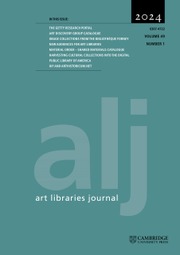No CrossRef data available.
Article contents
Contemporary art and fashion: from Pop to Populist
Published online by Cambridge University Press: 06 June 2016
Abstract
During the 1970s and 1980s, a number of American artists have made use of clothing as an art medium. Their work constitutes a new art movement, drawing on, and straddling divisions between, Pop Art, performing arts, popular culture, and fashion; it merits more thorough and accessible documentation, and there is a need for art libraries to make available the elusive information which does exist.
- Type
- Research Article
- Information
- Copyright
- Copyright © The Art Libraries Society 1989
References
1.
The vertical files at the American Craft Council and the Fashion Institute of Technology in New York were especially helpful. ACC keeps files by artists with slides, résumés, as well as published materials about the artists. Because the artists are responsible for sending in updated information, however, the currency of the artists’ files varies tremendously. FIT provides general subject access under “Art and Fashion”, with clippings that range widely in content including art’s influence on fashion designers, wearable art, artists inspired by fashion, and artists marketing wearable works.Google Scholar
2.
Good sources documenting Oldenburg’s Store and Happenings activities, include: Claes Oldenburg, Store Days (New York: Something Else Press, 1967); Rose, Barbara, Claes Oldenburg (New York: Museum of Modern Art, 1970); and Haskell, Barbara, Blam! The Explosion of Pop, Minimalism and Performance 1958-1964 (New York: Whitney Museum of American Art, 1984).Google Scholar
3.
Hickman, Pat. Innerskins/Outerskins: Gut and Fishskin (San Francisco: San Francisco Craft and Folk Art Museum, 1987).Google Scholar
6.
The most comprehensive and elaborate source which describes the wearable art movement and includes a wide range of artists is the book of Julie Shafler Dale, Art to Wear (New York: Abbeville, 1986).Google Scholar
7.
Harris, Patricia and Lyon, David. “The Fabric Workshop”. Fiberarts Magazine
15, January/February 1989, p.28–32. A catalogue documenting an exhibition to celebrate the tenth anniversary of The Fabric Workshop describes many of their activities: A Decade of Pattern (Philadelphia: The Fabric Workshop, 1988).Google Scholar
9.
A catalogue of Warhol’s large collection of watches is published in The Andy Warhol Collection: Sold for the Benefit of the Andy Warhol Foundation for the Visual Arts. New York: Sotheby’s
1988. Volume 3: Jewelry and Watches.Google Scholar
10.
Andy Warhol Times/5 by Movado. New York: Estate of Andy Warhol and Movado Watch Corporation, 1988. (Catalogue).Google Scholar
12.
Akamine, Estelle. “Through the Camera’s Eye: Howard Munson’s Body Coverings”. Fiberarts Magazine no. 14 May/June 1987 p. 44–45.Google Scholar
13.
Carr, Rebecca. “A Grass Suit: The Purest Fiber”. Fiber-arts Magazine no. 16
Summer
1989, p. 10.Google Scholar
14.
Frank, Peter and McKenzie, Michael. New Used & Improved: Art for the 80’s. New York: Abbeville, 1987, p.129.Google Scholar
15.
Some of the best examples of wearable art can be found at: Obiko in San Francisco, Julie: Artisan’s Gallery and Artwear in New York, and The Hand and the Spirit Gallery in Scottsdale, Arizona.Google Scholar
16.
Manhart, Marcia and Tom, , eds., The Eloquent Object. Tulsa: Philbrook Museum of Art, 1987, p. 185.Google Scholar
17.
Jones, Alan. “Keith Haring: Art or Industry?” New York Talk, June 1986, p.45.Google ScholarPubMed


